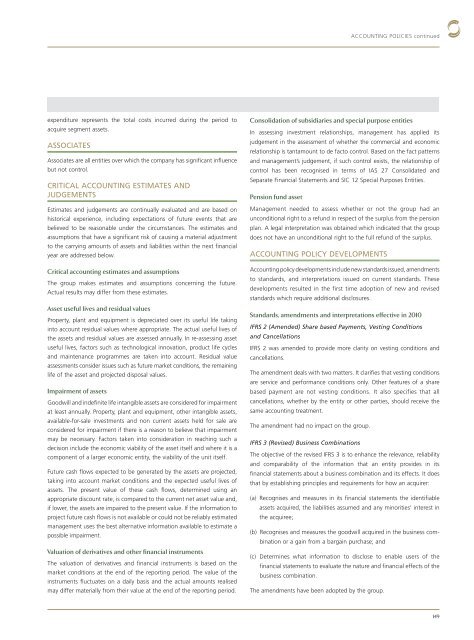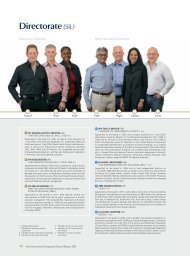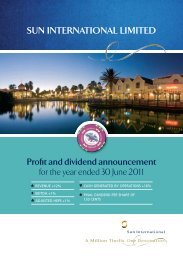PDF 25 MB - Sun International | Investor Centre
PDF 25 MB - Sun International | Investor Centre
PDF 25 MB - Sun International | Investor Centre
You also want an ePaper? Increase the reach of your titles
YUMPU automatically turns print PDFs into web optimized ePapers that Google loves.
expenditure represents the total costs incurred during the period to<br />
acquire segment assets.<br />
ASSOCIATES<br />
Associates are all entities over which the company has significant influence<br />
but not control.<br />
CRITICAL ACCOUNTING ESTIMATES AND<br />
JUDGEMENTS<br />
Estimates and judgements are continually evaluated and are based on<br />
historical experience, including expectations of future events that are<br />
believed to be reasonable under the circumstances. The estimates and<br />
assumptions that have a significant risk of causing a material adjustment<br />
to the carrying amounts of assets and liabilities within the next financial<br />
year are addressed below.<br />
Critical accounting estimates and assumptions<br />
The group makes estimates and assumptions concerning the future.<br />
Actual results may differ from these estimates.<br />
Asset useful lives and residual values<br />
Property, plant and equipment is depreciated over its useful life taking<br />
into account residual values where appropriate. The actual useful lives of<br />
the assets and residual values are assessed annually. In re-assessing asset<br />
useful lives, factors such as technological innovation, product life cycles<br />
and maintenance programmes are taken into account. Residual value<br />
assessments consider issues such as future market conditions, the remaining<br />
life of the asset and projected disposal values.<br />
Impairment of assets<br />
Goodwill and indefinite life intangible assets are considered for impairment<br />
at least annually. Property, plant and equipment, other intangible assets,<br />
available-for-sale investments and non current assets held for sale are<br />
considered for impairment if there is a reason to believe that impairment<br />
may be necessary. Factors taken into consideration in reaching such a<br />
decision include the economic viability of the asset itself and where it is a<br />
component of a larger economic entity, the viability of the unit itself.<br />
Future cash flows expected to be generated by the assets are projected,<br />
taking into account market conditions and the expected useful lives of<br />
assets. The present value of these cash flows, determined using an<br />
appropriate discount rate, is compared to the current net asset value and,<br />
if lower, the assets are impaired to the present value. If the information to<br />
project future cash flows is not available or could not be reliably estimated<br />
management uses the best alternative information available to estimate a<br />
possible impairment.<br />
Valuation of derivatives and other financial instruments<br />
The valuation of derivatives and financial instruments is based on the<br />
market conditions at the end of the reporting period. The value of the<br />
instruments fluctuates on a daily basis and the actual amounts realised<br />
may differ materially from their value at the end of the reporting period.<br />
ACCOUNTING POLICIES continued<br />
Consolidation of subsidiaries and special purpose entities<br />
In assessing investment relationships, management has applied its<br />
judgement in the assessment of whether the commercial and economic<br />
relationship is tantamount to de facto control. Based on the fact patterns<br />
and management’s judgement, if such control exists, the relationship of<br />
control has been recognised in terms of IAS 27 Consolidated and<br />
Separate Financial Statements and SIC 12 Special Purposes Entities.<br />
Pension fund asset<br />
Management needed to assess whether or not the group had an<br />
unconditional right to a refund in respect of the surplus from the pension<br />
plan. A legal interpretation was obtained which indicated that the group<br />
does not have an unconditional right to the full refund of the surplus.<br />
ACCOUNTING POLICY DEVELOPMENTS<br />
Accounting policy developments include new standards issued, amendments<br />
to standards, and interpretations issued on current standards. These<br />
develop ments resulted in the first time adoption of new and revised<br />
standards which require additional disclosures.<br />
Standards, amendments and interpretations effective in 2010<br />
IFRS 2 (Amended) Share based Payments, Vesting Conditions<br />
and Cancellations<br />
IFRS 2 was amended to provide more clarity on vesting conditions and<br />
cancellations.<br />
The amendment deals with two matters. It clarifies that vesting conditions<br />
are service and performance conditions only. Other features of a share<br />
based payment are not vesting conditions. It also specifies that all<br />
cancellations, whether by the entity or other parties, should receive the<br />
same accounting treatment.<br />
The amendment had no impact on the group.<br />
IFRS 3 (Revised) Business Combinations<br />
The objective of the revised IFRS 3 is to enhance the relevance, reliability<br />
and comparability of the information that an entity provides in its<br />
financial statements about a business combination and its effects. It does<br />
that by establishing principles and requirements for how an acquirer:<br />
(a) Recognises and measures in its financial statements the identifiable<br />
assets acquired, the liabilities assumed and any minorities’ interest in<br />
the acquiree;<br />
(b) Recognises and measures the goodwill acquired in the business combi<br />
nation or a gain from a bargain purchase; and<br />
(c) Determines what information to disclose to enable users of the<br />
financial statements to evaluate the nature and financial effects of the<br />
business combination.<br />
The amendments have been adopted by the group.<br />
149










